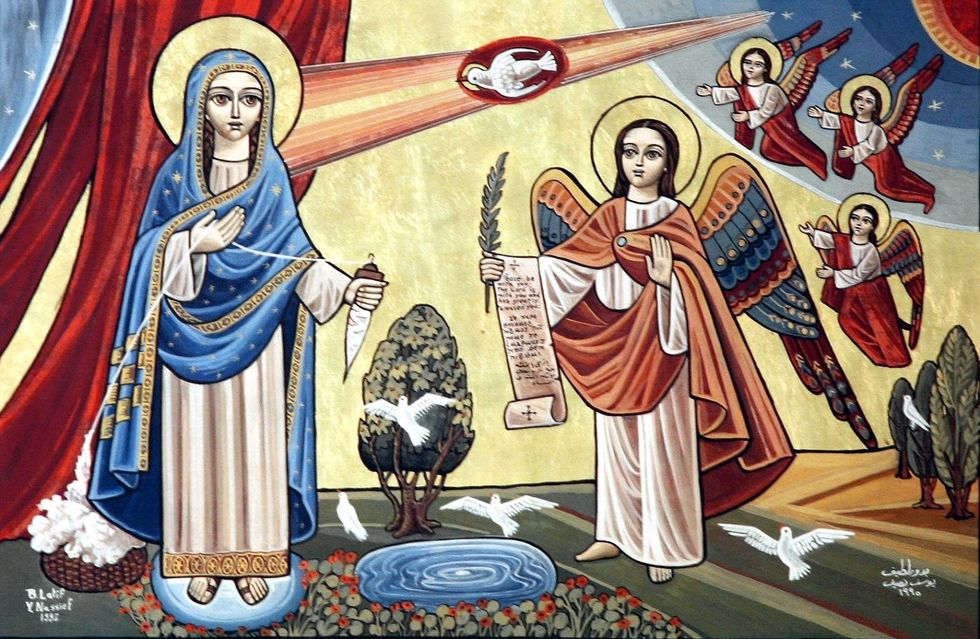This piece was adapted and shortened from an earlier post on my personal blog.
Christmas is one of those days that has been nearly severed from its real meaning in public understanding. I've only begun to appreciate it over the last couple years, so I'd like to share a bit of what I've learned.
The chief doctrine of Christmas is the incarnation. As the Apostle Paul writes in Philippians 2:6-11, this means that
"though he was in the form of God, did not count equality with God a thing to be grasped, but emptied himself, by taking the form of a slave, being born in the likeness of men. And being found in human form, he humbled himself by becoming obedient to the point of death, even death on a cross. Therefore God has highly exalted him and bestowed on him the name that is above every name, so that at the name of Jesus every knee should bow, in heaven and on earth and under the earth, and every tongue confess that Jesus Christ is Lord, to the glory of God the Father."
If God himself was willing to humble himself this far out of love for us, how much more should we mere idolatrous humans humble ourselves in the service of others?
Indeed, God's love for the undeserving and outcasts is a constant theme in the Christmas narratives. Take the genealogy of Jesus in Matthew 1.This would normally only list male family members, and given the intensely nationalistic understanding of the Messiah's mission, one would expect a purely Jewish heritage of men who faithfully observed the Torah.
Instead, Matthew lists five women, affirming their dignity and worth during in a society where a woman's testimony wasn't even admissible in court. These women are Tamar, Rahab, Ruth, Bathsheba, and Mary. They also did not fit the racial expectations of their day; Rahab was a Gentile (Josh 2), and Tamar may have been as well (Jubilees 41:1 lists her as an Aramean). This affirms that people of all ethnicities and races are included in God's family.
Furthermore, Rahab was a prostitute; Bathsheba committed adultery with King David (2 Sam. 11:1-12:25), which is how she became pregnant with Solomon; Tamar tricked her father-in-law into getting her pregnant with Perez (Gen. 38:1-30; yes, it's a weird story). This means that three of the five women recorded in Jesus' genealogy were known as sinners, and for two of them, the sins they were known for were actually the means by which the became ancestors of Jesus.
Remember as well that Mary, the mother of Jesus, would have been viewed as a sexual transgressor for being pregnant out of wedlock. That their sins, real or perceived, were sexual and took place in a patriarchal honor/shame culture compels us to consider carefully the interaction of shame & power with sex & gender in our own culture. Above all, we learn this: in Jesus, all we sinners are reconciled to God- male and female, Jew and Gentile, rich and poor. God shows no partiality. (For an excellent discussion of this, see Kenneth E. Bailey, "Jesus Through Middle Eastern Eyes: Cultural Studies in the Gospels", 38-55).
The other chief lesson of the incarnation is that God's entrance into his creation and indwelling of human flesh affirms the essential goodness of the created order and the material world. Many Christians have unconsciously swallowed a dualistic version of Christianity that says that the physical world, particularly the human body, is a prison, and the whole point of Christianity is to escape it and spend eternity as a disembodied spirit in an immaterial otherworld.
So why does this matter?
It matters because how we view the material world has enormous implications for how we live our lives.
If the earth that God created is a hindrance to our ultimate goal, we will not care for it. It matters because it affirms that our bodies will be redeemed; "for if the flesh were not in a position to be saved, the Word of God would in no wise have become flesh" (Irenaeus, "Against Heresies" 5.14.1).
If we believe our only goal as Christians is to "win souls" and ignore God's concern for the entirety of the person, we will completely miss both our general purpose as humans to reflect the image of God and cultivate the earth (Gen. 1:28-30) and our particular mission as the Church to work for the Kingdom of God as outlined in Luke 4:16-30. Even more seriously, if we view the creation that God declared "very good" (Gen. 1:31) negatively, we blaspheme him and call him a liar.
So this Christmas, let's put away all the arguments and anger about losing our cultural hegemony. Let's instead remember the beautiful truth of the incarnation: that God became human in order to reconcile all people to himself and redeem his good but fallen creation. Let's sing with joy alongside all of creation, allowing its beauty to push us into a deeper love of the Creator.
All Scripture quotations are from the English Standard Version (ESV), published by Crossway. I modified the translation of Philippians 2:6-11 to read "slave" instead of "servant" (Greek δοῦλος doulos).



 Photo by
Photo by  Photo by
Photo by  Photo by
Photo by 



















